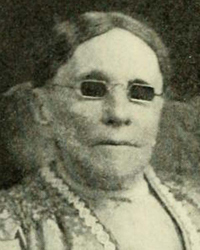History of Hymns: "Pass Me Not, O Gentle Savior"
"Pass Me Not, O Gentle Savior"
Fanny J. Crosby
The United Methodist Hymnal, No. 351
 |
|
Fanny J. Crosby |
Pass me not, O gentle Savior,
here my humble cry;
while on others thou art calling,
do not pass me by.
Fanny Jane Crosby (1820-1915) “set the standard for the ‘successful’ writing of gospel hymns,” according to UM Hymnal editor Carlton R. Young. She was the author of over 8,500 gospel songs.
Blind at six weeks of age, Crosby began composing texts at age 6. She began her study at age 12 at the New York School for the Blind, a school she later served as a teacher. A friend of several presidents, Crosby became one of the most important advocates for the cause of the blind in the United States, addressing a session of Congress on the topic.
Her texts were set to the compositions of some of the most prominent gospel composers of the day including William Bradbury, William Doane, Robert Lowry and Ira Sankey. Crosby composed under a number of pen names. She married blind musician Alexander Van Alstyne, and British hymnals insist on using her married name, Frances Van Alstyne.
“Pass me not” (1868) first appeared in Songs of Devotion for Christian Associations (1870), a collection compiled by William H. Doane (1832-1915). The late hymnologist William J. Reynolds discovered that the inspiration for this hymn was the result of a visit to a prison by the poet during spring 1868. He notes: “After she had spoken and some of her hymns had been sung, she heard one of the prisoners cry out in a pleading voice, ‘Good Lord, do not pass me by’; Following Doane’s suggestion, she wrote a hymn that evening incorporating the line, “Pass me not, O gentle Savior.”
The hymn gained international recognition when introduced by Dwight L. Moody and Ira D. Sankey during their London revivals. According to Dr. Young, “This is Crosby’s first hymn to win worldwide acclaim.”
The text would seem to have a biblical basis on the blind beggars’ plea to Christ: “And, behold, two blind men sitting by the way side, when they heard that Jesus passed by, cried out, saying, Have mercy on us, O Lord, thou son of David. And the multitude rebuked them, because they should hold their peace: but they cried the more, saying, Have mercy on us, O Lord, thou son of David” (Matthew 20:29-31; See also Mark 10:46-52 and Luke 18: 35-43).
“The hymn has been rightly criticized for its faulty exegesis,” says Dr. Young. “It is contrary to the scriptural account to suggest that Jesus Christ, God’s universal gift of salvation (John 3:16), could, should, would—and in this instance did—pass anyone by. These complaints were exacerbated, not diminished, when the poet changed the refrain from ‘while on others thou art smiling’ to ‘while on others thou art calling.’”
Crosby, a lifelong Methodist, demonstrates in other hymns that she is aware that God’s grace is given to all. Note, for example, Crosby’s hymn, “To God be the glory” (UMH 98) where the author concludes the first stanza with: “[Christ] yielded his life an atonement for sin,/and opened the life gate that all may go in.” The universality of the gospel was at the core of her faith and songs.
Gospel songs are not known for theological subtlety, and on occasion, skirt the edges of heresy to make a personal point. It is likely that the plea of the prisoner in Manhattan conflated with the passage of scripture, distorting the nuance of the biblical message. Indeed, many suffering souls have been passed.
Putting herself in the place of the suffering and disregarded, Crosby understood that some had been so rejected that it took faith to realize that Christ is the one who would never pass anyone by. His actions in so many cases bore witness that he cared for those forgotten by others including women, Samaritans and lepers, to name a few, who were deemed to be outcasts in their day.
Dr. Hawn is professor of sacred music at Perkins School of Theology, SMU.
Contact Us for Help
View staff by program area to ask for additional assistance.
